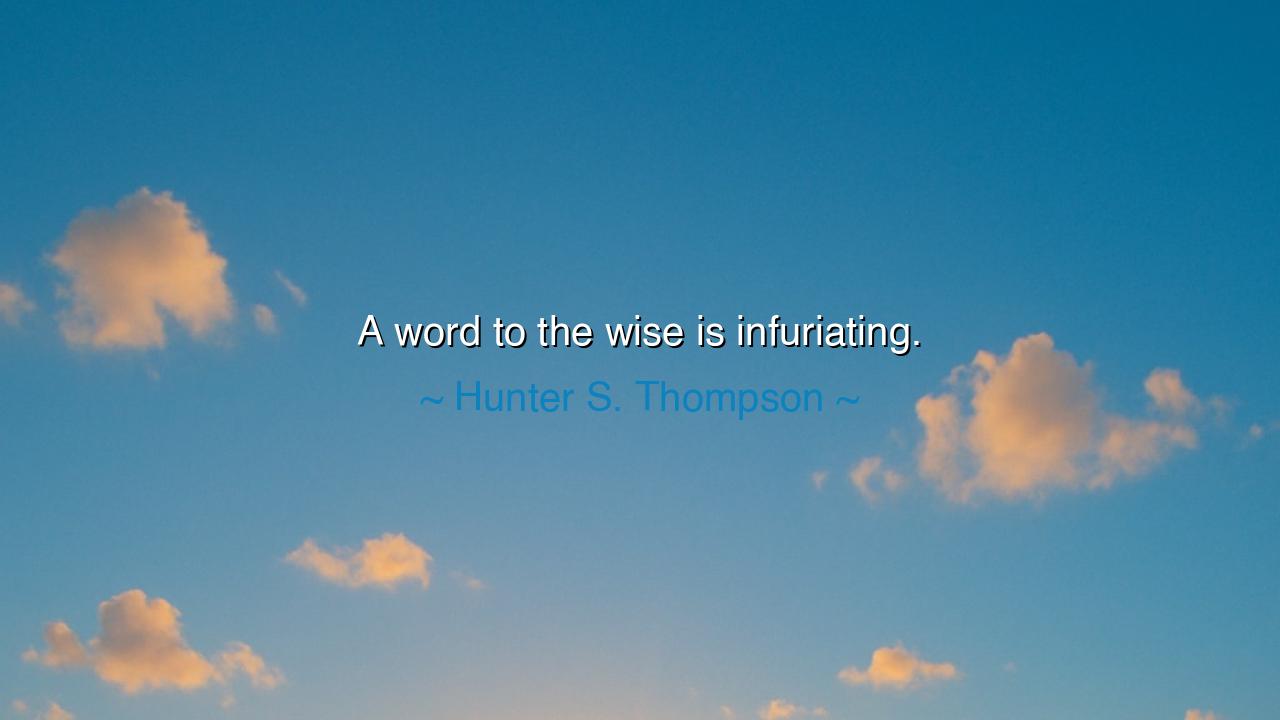
A word to the wise is infuriating.






In the vast tapestry of human experience, where wisdom and folly intertwine, there are moments when the words of a sage come not as a blessing, but as a curse. Hunter S. Thompson, the great provocateur of the 20th century, once remarked, “A word to the wise is infuriating.” These words, though seemingly simple, offer a profound reflection on the nature of wisdom, the burden of knowledge, and the complex relationship between the learner and the teacher. For in the ancient world, as it is today, wisdom was often not a gift to be embraced, but a challenge to be endured.
Consider the story of Socrates, whose wisdom was not just a means of enlightenment, but a source of discomfort for those around him. Socrates famously said, “The unexamined life is not worth living.” In his relentless pursuit of truth, he forced others to confront uncomfortable questions about their lives, their beliefs, and their values. For many, this was not a call to wisdom, but a confrontation with their own ignorance. Socrates' method was not designed to comfort or reassure, but to disrupt and challenge. In this way, his words, though full of profound insight, were often met with resentment—as Thompson suggests, a word to the wise can indeed be infuriating because it exposes the gap between what one knows and what one believes to be true.
The ancient Greeks also understood that wisdom often carries a price. King Oedipus, in his quest to solve the riddle of his past, sought wisdom from the oracle, only to discover that the knowledge he gained led to his tragic downfall. The prophecy, delivered in cryptic and puzzling words, was a form of wisdom that he could neither escape nor fully understand until it was too late. Oedipus, like many who are gifted with insight, found that the pursuit of truth often brings pain—an unsettling discomfort that arises when one is forced to confront the harsh realities of existence. Thus, the word to the wise is infuriating, for it reveals uncomfortable truths that are not easily embraced.
The same sentiment is echoed in the stories of the philosophers and mystics of the ancient world, who were often misunderstood or even ostracized for their wisdom. Diogenes, the cynic philosopher, lived in a barrel and provoked the elite with his stark criticism of societal norms. His words were meant not to comfort but to disrupt—to force people to see the absurdities of their lives. Diogenes, like Socrates, understood that wisdom does not serve the comfortable or the complacent; rather, it unsettles the soul, stirring the mind to question and reflect on what is often left unquestioned. In this sense, a word to the wise is infuriating because it calls one to action, to change, and to an uncomfortable truth that cannot be ignored.
In the modern world, Thompson’s words speak to the disillusionment felt by many who seek wisdom but are unwilling to confront the difficult truths it reveals. In journalism, in politics, and in the media, the wise often offer commentary that challenges the status quo, but their voices are frequently drowned out by the noise of those who prefer comfortable illusions. Thompson himself, as a writer and journalist, embodied the archetype of the truth-teller, whose words were often uncomfortable and provocative. His work, filled with sharp criticism of political institutions, was not meant to soothe, but to incite thought, to provoke a reaction, and to wake people from the slumber of complacency. His quote reminds us that wisdom is not about gentle guidance; it is about confrontation, about facing the uncomfortable realities that often lie hidden beneath the surface.
The lesson from Thompson’s words is one of courage and reflection. Wisdom, though often difficult to bear, is the only true compass we have in a world filled with distractions and false comforts. It is infuriating because it forces us to face what we would rather avoid—our own failings, our ignorance, and our misunderstandings. But it is also liberating, for in accepting the challenge of wisdom, we free ourselves from the chains of illusion. To embrace wisdom is to embrace discomfort, for only through discomfort do we grow, learn, and transform.
In our own lives, the practical action we must take is to welcome the discomfort that comes with wisdom. When we encounter truths that infuriate us, we must not shy away from them, but rather embrace them as opportunities for growth. Wisdom does not seek to pacify; it seeks to elevate, to transform, and to challenge. Just as the great philosophers and rebels of the past used their words to shake society awake, so too must we use the wisdom we gain—not to comfort ourselves, but to provoke change and reflection in the world around us. Let us not fear the infuriating truths, for in them lie the seeds of true enlightenment.






AAdministratorAdministrator
Welcome, honored guests. Please leave a comment, we will respond soon